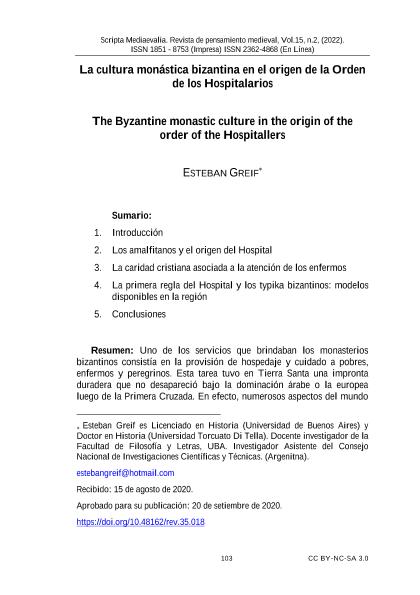Mostrar el registro sencillo del ítem
dc.contributor.author
Greif, Esteban Augusto

dc.date.available
2023-09-28T14:37:13Z
dc.date.issued
2022-11
dc.identifier.citation
Greif, Esteban Augusto; La cultura monástica bizantina en el origen de la orden de los Hospitalarios; Universidad Nacional de Cuyo. Facultad de Filosofía y Letras. Centro de Estudios Filosóficos Medievales; Scripta Medievalia; 15; 2; 11-2022; 103-128
dc.identifier.issn
1851-8753
dc.identifier.uri
http://hdl.handle.net/11336/213451
dc.description.abstract
Uno de los servicios que brindaban los monasterios bizantinos consistía en la provisión de hospedaje y cuidado a pobres, enfermos y peregrinos. Esta tarea tuvo en Tierra Santa una impronta duradera que no desapareció bajo la dominación árabe o la europea luego de la Primera Cruzada. En efecto, numerosos aspectos del mundo bizantino han sido registrados, en el arte, la economía y la sociedad que los europeos establecieron en el Reino Latino de Jerusalén. De la misma manera, los historiadores han detectado más de un préstamo e influencia propia de la organización eclesiástica griega en aquella desplegada por los francos en los estados cruzados. En este trabajo exploramos los elementos de la cultura monacal bizantina que existían en la región sirio-palestina que influyeron en el origen de la hermandad de los Hospitalarios y la actividad médico-asistencial que desplegaron en la Ciudad Santa.
dc.description.abstract
One of the services provided by the byzantine monasteries was the lodging provision and care for the poor, the sick and peregrines. This task had in the Holy Land an enduring imprint that did not disappear neither under the Arabic rule or the European after the First Crusade. Indeed, many aspects from the byzantine world have been detected in the art, the economy and society established by the Europeans in the Latin Kingdom of Jerusalem. In the same way, historians have registered more than one loan and influence from the Greek ecclesiastical organization on that deployed by the Francs in the crusaders states. In this work we explore on the elements of the monastic byzantine culture that existed in the Syrian–Palestinian area and their influence on the origin of the brotherhood of the Hospitallers and the medical–assistance activity they displayed in the Holy City.
dc.format
application/pdf
dc.language.iso
spa
dc.publisher
Universidad Nacional de Cuyo. Facultad de Filosofía y Letras. Centro de Estudios Filosóficos Medievales
dc.rights
info:eu-repo/semantics/openAccess
dc.rights.uri
https://creativecommons.org/licenses/by-nc-sa/2.5/ar/
dc.subject
BIZANCIO
dc.subject
CARIDAD
dc.subject
HOSPITALARIOS
dc.subject
MONASTERIOS
dc.subject.classification
Historia

dc.subject.classification
Historia y Arqueología

dc.subject.classification
HUMANIDADES

dc.title
La cultura monástica bizantina en el origen de la orden de los Hospitalarios
dc.title
The Byzantine monastic culture in the origin of the order of the Hospitallers
dc.type
info:eu-repo/semantics/article
dc.type
info:ar-repo/semantics/artículo
dc.type
info:eu-repo/semantics/publishedVersion
dc.date.updated
2023-07-07T18:11:04Z
dc.identifier.eissn
2362-4868
dc.journal.volume
15
dc.journal.number
2
dc.journal.pagination
103-128
dc.journal.pais
Argentina

dc.journal.ciudad
Mendoza
dc.description.fil
Fil: Greif, Esteban Augusto. Consejo Nacional de Investigaciones Científicas y Técnicas. Oficina de Coordinación Administrativa Saavedra 15. Instituto Multidisciplinario de Historia y Ciencias Humanas; Argentina
dc.journal.title
Scripta Medievalia
dc.relation.alternativeid
info:eu-repo/semantics/altIdentifier/url/https://revistas.uncu.edu.ar/ojs3/index.php/scripta/article/view/6397
Archivos asociados
